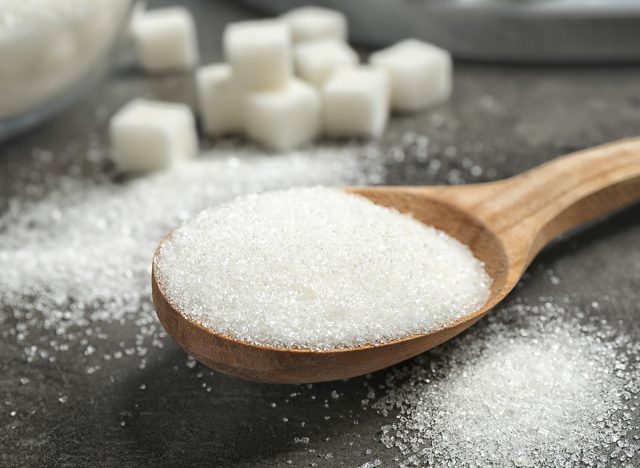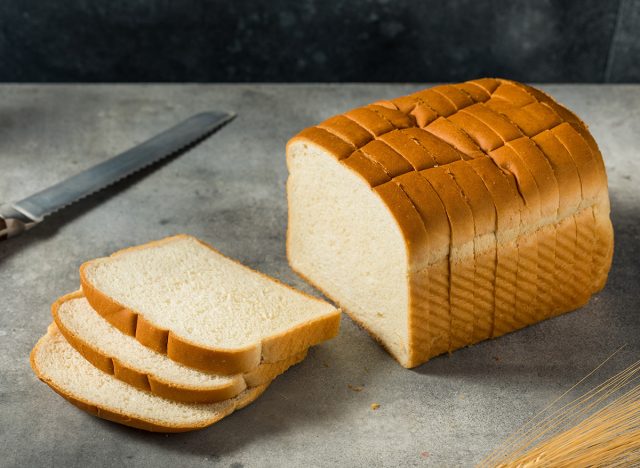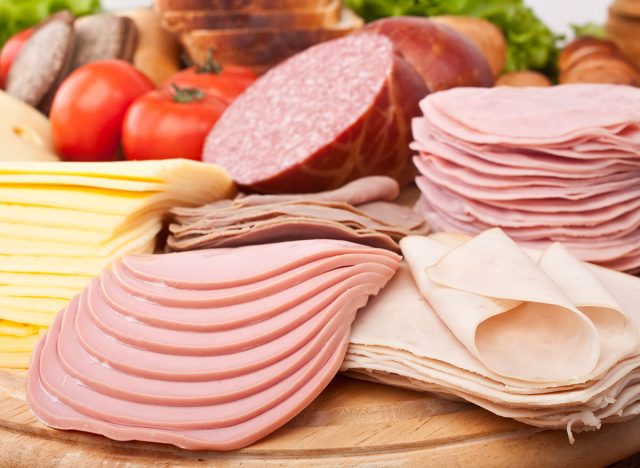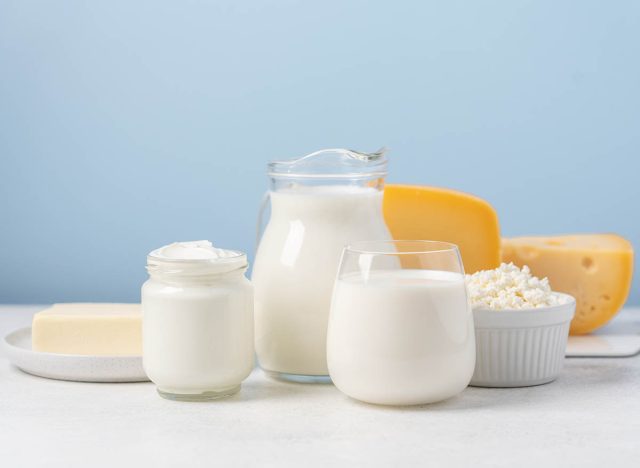10 Foods to Avoid That Cause Inflammation
Are you experiencing inflammation? It might be time to make a few dietary changes. Lacey Baier (@LaceyBaier_) is a Sweet Pea chef and social media influencer who promotes a healthy "cleanish" lifestyle on her YouTube channel. In a popular video, she unveils a bunch of foods that cause inflammation. "In this video, we take a look at the top foods that cause inflammation and what to look for instead," she writes about the viral video. "We've been hearing for the past several years about inflammation, how it's the cause of a lot of pain and discomfort, and how it's actually part of the root of so many illnesses and diseases. While inflammation can be a good thing, since it's your body's natural response to trying to protect itself, the bottom line is inflammation and bloating can be very uncomfortable, especially if you're not injured or sick, and it can keep you from enjoying a happy, healthy lifestyle," she explains. "So today I'm gonna share with you 10 types of foods that can actually cause inflammation within your body so that you can avoid those and don't risk having those triggered within your diet."
Table Sugar

First up? Table sugar, "also called sucrose and high fructose corn syrups" are very highly associated with causing inflammation in your body, "which can ultimately lead to disease," she says. "So sugar is made up of 50% glucose and 50% fructose. And high fructose corn syrup is made up of 60% fructose and 40% glucose. The reason why we're paying attention to this is because fructose and excess levels of fructose in your body have been linked to a lot of issues like fatty liver disease, diabetes, insulin resistance, weight gain, obesity, cancer, chronic kidney disease, heart disease, and many more. So to avoid foods that are high in fructose, you're gonna wanna avoid things like candy sodas, pastries cakes, cookies, donuts, and a lot of breakfast cereals. And if you wanna check out my video on sneaky hidden sugars, there's a lot of examples on more types of specific brands that you wanna be looking out for."
Trans Fats

"Trans fats are some of the unhealthiest foods that you can eat," she says. "Unlike naturally occurring fats that come from plants and foods, trans fats are artificially created and essentially your body does not like them. Studies have actually shown that increased levels of trans fats in your diet cause inflammation within your adipose tissue, which is your fat tissues. So that's gonna cause a lot of issues for heart disease and arthritis is gonna really flare up that inflammation" Why do people put them in food? They help extend the shelf life of pastries and baked goods. "Foods to avoid that are high in trans fats are things like french fries, margarine, pretty much any pre packaged like cakes and muffins and cookies and donuts, and anything that says partially hydrogenated oils on the label is gonna have a trans fat in there."
Refined Carbohydrates

Refined carbohydrates "take a nutrient rich food and strips it of all of its nutrients, and then takes that other piece that's been stripped and gives that to you," she says. "So you're basically getting a food that's been stripped of all minerals and vitamins and fiber and all of the good stuff that food is supposed to provide to you." They also have a higher glycemic index score, "so that means that refined foods are gonna cause your blood sugar levels to increase more than other foods, and with higher glycemic index foods, you're gonna have increased inflammation." Foods that are high in refined carbs are breads, pastas, chips, pizza, candy, breakfast cereals, cookies, sodas, "and other foods that contain a lot of processed sugar or processed flour." Instead, she recommends foods that have whole grains that aren't processed.
Processed Meats

"Processed meats are highly associated with heart disease, obesity, and cancers like in your stomach and in your colon because of how they're processed and how these foods are cooked at higher temperatures, they definitely cause inflammation in our bodies," she says. "Foods that are in this category would include bacon, sausage, smoked meats, deli meats, ham and jerky. But not all of those are bad for you. So you wanna look for foods that contain no nitrates or nitrites and avoid foods that are smoked."
RELATED: 10 Critical Things You Need to Tell Your Doctor Before Starting Ozempic
MSG

"Monosodium glutamate, also known as MSG, is a flavor enhancing additive that is added to food. It basically is a food additive that easily triggers two different types of inflammation and can cause issues in your liver," she claims. "Foods that are high in MSG include prepackaged soups, salad dressings, fast food, and deli meats. So oftentimes when you're dining out, you kind of have to ask or look for signs that show you that no MSG is added. And you can also always take a look at the labels to avoid foods that contain added MSG."
Gluten

Next up, gluten, "something that is particularly difficult for people who are sensitive to joint pain," she says. "It can also set off an autoimmune response for people with celiac disease in which it really causes a lot of pain and discomfort and can actually damage small intestines and cause a lot of joint pain." For these people, she recommends gluten-free products that don't contain any of the other ingredients mentioned.
Aspartame

She also recommends avoiding aspartame, "an added sweetener that contains no nutritional value or calories, so it's often used in foods that are sugar free," she says. "But one of the problems with aspartame is that a lot of people's bodies react very negatively to it and treat it like it's a foreign substance, and they try to attack it with their autoimmune systems. And when that happens, that causes an inflammatory response. So foods that are marketed as sugar free as a healthy option, like diet sodas or sugar-free candies or sugar-free drinks can actually cause a pretty big inflammatory response in a lot of individuals. So to avoid that, you can just look for foods that contain no added sweeteners or no artificial sugars."
Casein

Some recent studies have actually shown that casein, which is prevalent in milk and dairy products, can actually cause an inflammatory response and a gastrointestinal issue in a lot of people. "That means it can cause a lot of bloating and discomfort in your stomach.," she says. "So if after consuming casein you find that you actually have that type of response, instead try looking for foods that contain no casings that aren't dairy related, that are actually plant-based alternatives."
RELATED: What Happens to Your Body When You Stop Eating Veggies
Omega-3 and 6 Fatty Acids

"While our bodies do require certain levels of Omega-3 and omega six fatty acids, which are contained in vegetable oils and seed oils, having too much omega six fatty acids can actually cause an inflammatory response," she says. "Foods that are high in vegetable oils and seed oils are gonna be pretty obvious. They're gonna be your vegetable oils plus mayonnaise, and oftentimes store-bought salads contain a lot of these oils," she says. Instead, you should look for foods that contain avocado oil, olive oil, and coconut oil, "much better options if you have an inflammatory response to those types of oil."
Alcohol

Another no-no? Inflammation. "While moderate amounts of alcohol consumption does have some actual health benefits, having too much alcohol, especially on a regular basis, can cause a lot of inflammatory issues," she says. "So higher alcohol consumption would be for men who have more than two drinks a day, or for women who have more than one drink every day. The problem with excessive alcohol is that it causes your liver to have difficulty removing those toxins from your body. And your liver is responsible for removing all different types of toxins. So the more you stress it for the alcohol, the more it's gonna be stressed for other things, and it's not gonna do as good of a job of removing all of those toxins from your body, which is then gonna cause that inflammation. So the easy way to reduce that is just to reduce your alcohol consumption." And if you enjoyed this article, take advantage of these 15 Quick Ways to Lose Body Fat Percentage in a Week.





